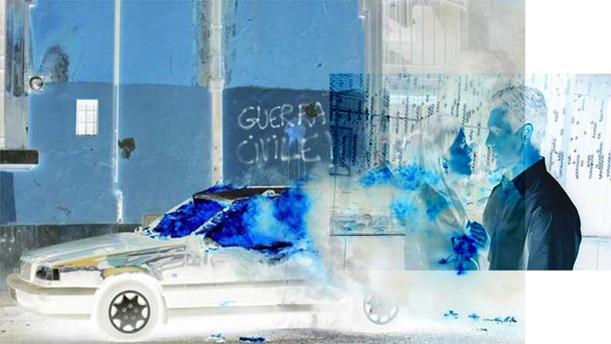JB Jurve is pleased to present Civil War, an exhibition of new work by Mario Cutajar. The opening reception will be held Saturday, January 14 from 7 to 10 p.m., and the exhibition will remain on view through February 11, 2012.
Civil War, LA-based artist Mario Cutajar’s first show at JB Jurve, takes its name from a graffito left on a wall behind a torched car set alight during an October, 2011, protest in Rome against the financial institutions that precipitated the current global economic crisis. The image of the burning car, montaged with a publicity shot of a face-to-face couple from the cable TV show The Real Housewives of New York, is presented as a photomural-size enlargement assembled from 176 letter-size inkjet prints taped together. It recurs in a different format in an artist’s book (also titled Civil War) Cutajar put together to coincide with the JB Jurve exhibition. Altogether, the book contains 22 such montages, each accompanied by a line from Bertolt Brecht’s 1943 poem, “The Active Discontented.” Three of the montages, enlarged to floor-to-ceiling dimensions, are included in the exhibition. They are counterpoised with the text of another Brecht poem, “Of Sprinkling in the Garden,” which Brecht wrote while living in Santa Monica as a refugee from Nazi-ruled Germany. Cutajar has enlarged the text and placed the letter-size sections of the enlargement on the floor enclosed by the wall-mounted prints, inviting viewers to walk over and disperse the text as they move about the gallery. “Of Sprinkling in the Garden” records the joy of showering water on all the thirsty trees and plants in the poet’s garden, including the weeds and “even the naked soil.”
Cutajar notes that the poem today recalls the Maoist slogan of “Letting a hundred flowers blossom,” which seems topical in relation to the Occupy and other protest movements provoked by the economic crisis. “The gallery can also be conceived of as a site of pleasure and cultivation metaphorically linked to Brecht’s egalitarian garden where the dispersal of water has both erotic and political connotations. Brecht’s poetry is exemplary because it fuses politics and art into a single metabolic process of taking in and intensifying the reality at hand.”
Cutajar use of montage conjures that of John Heartfield, whose work he has in the past directly referenced. “But it’s Heartfield as he appears through the intervening filters of Situationist graphics and what I think of as the Franciscan aesthetics of Arte Povera. For me the experience of capitalism is not schizophrenic, as Jameson contends, but obsessional: capitalism derealizes the world by repressing connections, by compartmentalizing, separating destitution from accumulation, war from business, military aggression from the way it constructs the enemies that justify its application. So for me, montage is a way to reestablish connections but without hiding that this reestablishing of connections is itself provisional, of the order of a psychoanalytical construction, which Freud was the first to recognize, is always a myth.”
Mario Cutajar received his MFA from Art Center College of Design. He is the recipient of Pollock-Krasner and National Endowment for the Arts grants. His previous artist book, SPIN, is distributed by JB Jurve. He teaches at Otis College of Art and Design.












